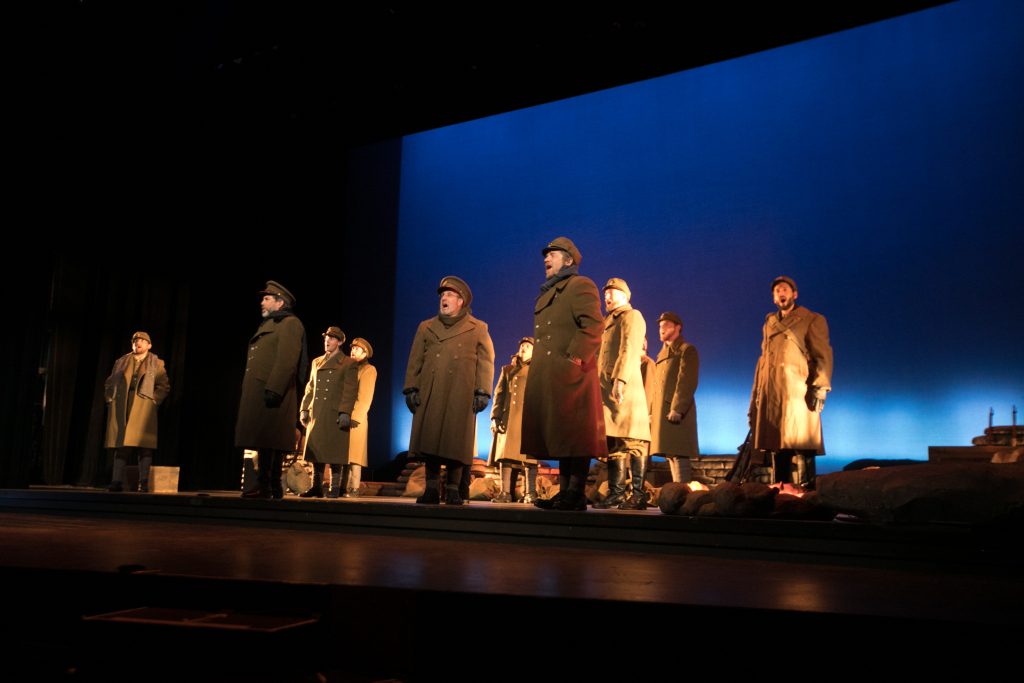Vibrant, Probing Production of ‘All Is Calm–The Christmas Truce of 1914’ at the Balboa
Most holiday season offerings by performing arts organizations offer cozy, nostalgic forays into an imaginary past where every challenge is overcome and every cold heart converted by the message of the season.

Cast of All Is Calm [photo courtesy of San Diego Opera]
With collaboration from Bodhi Tree Concerts and Sacra/Profana, San Diego Opera opened a powerful new production of All Is Calm Friday (December 7) at the Balboa Theatre. What makes this recent choral chamber opera compelling is the juxtaposition of Rothstein’s libretto, drawn from letters and diaries of the military men involved, and the telling musical arrangements of carols and popular songs of the era by Erick Lichte and Timothy C. Takach.
To this atypical seasonal work, choral conductor Juan Carlos Acosta brought a muscular male chorus bravado that balanced the bright color of a typical opera chorus with the warm blend of a liturgical choir. Strong solo voices frequently opened a song or carol with hearty declamation, but they were quickly joined by the other singers to expand the musical texture, since this opera has no orchestra or other instrumental accompaniment.
Director Alan E. Hicks arranged his troops (for once, this noun is literal—not a metaphor!) in coherent motion on the Balboa’s wide stage, keeping the work’s dramatic power in sharp focus.
The old Scottish traditional ballad “Will Ye Go To Flanders?” frames much of the work’s action. Flanders served as a frequent battlefield in European history, and the All Is Calm arrangers gave a poignant, almost mournful harmonic cast to this ballad that ostensibly portrays military calling in terms of gallant pomp and pageantry. We hear the Irving Berlin Tin Pan Alley tune “Alexander’s Ragtime Band” turned into a snappy recruitment commercial “Come On and Join,” and of course solemn patriotic fare such as “God Save the King” and Haydn’s lovely birthday hymn to the Austrian Emperor turned into “Deutschland, Deutschland, über alles.” To the peppy British Music Hall song “Pack Up Your Troubles in Your Old Kit Bag and Smile” Rothstein pairs the more realistic “I Want to Go Home” written by the Canadian Lieutenant Gitz Rice.
But musical transformations happen when Takach and Lichte move from “Silent Night” in its original German, then French, and finally to the English version that quickly blossoms into a gripping, harmonically rich anthem based on the phrase “All Is Calm” from the English version of the carol. The men gave equal depth and ardor to another bilingual carol, “Lo How A Rose E’er Blooming,” the familiar English translation of Michael Praetorius’ “Es ist ein’ Ros’ entstrpungen.” Some lighter moments surface in All Is Calm, such as turning the old English carol “Wassail, Wassail” into a rousing drinking song and the German soldiers crooning “O Tannenbaum” to a tiny shrub of a tree.
The singing of “Auld Lang Syne” signals the end of the truce, accompanied by resounding denunciations of the soldiers’ “fraternization with the enemy” by members of the military brass.
Tim Wallace’s simple unit stage design allowed the actor/singers maximum freedom of movement, but Anne E. MeMills’ mysteriously beautiful star-clustered sky offered a cosmic blessing to the actions of these soldiers.
I do regret that several of the carols heard in last year’s production of All Is Calm by Bodhi Tree Concerts and Sacra/Profana, were dropped from the piece, e.g. “O Come, O Come, Emmanuel,” “Bring A Torch, Jeanette, Isabella,” and “Good King Wenceslas.”
The drama and choral vibrancy of the performance of this probing work is beyond question, a worthy offering in any season, but especially in this mid- December.
This production of “All Is Calm—The Christmas Truce of 1914” was a joint production of San Diego Opera, Bodhi Tree Concerts, and Sacra/Profana. It opened at downtown San Diego’s Balboa Theatre on December 7, 2018, and continues for two additional performances in the same venue on December 8 & 9.

Ken Herman, a classically trained pianist and organist, has covered music for the San Diego Union, the Los Angeles Times’ San Diego Edition, and for sandiego.com. He has won numerous awards, including first place for Live Performance and Opera Reviews in the 2017, the 2018, and the 2019 Excellence in Journalism Awards competition held by the San Diego Press Club. A Chicago native, he came to San Diego to pursue a graduate degree and stayed.Read more…


